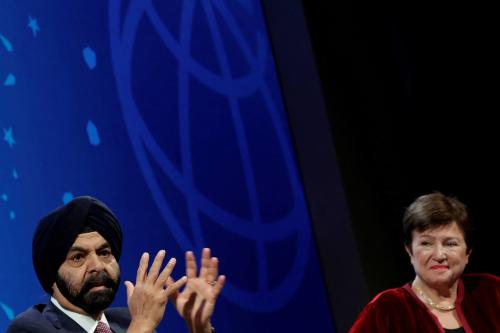The long institutional nightmare is over. That, at least, is the hope at the World Bank, now that Paul Wolfowitz has resigned as the bank’s president amid the furor over the hefty pay raise and job transfer received by his woman friend, a bank employee. With any luck, this will end the enormously distracting, increasingly tiresome debate over whether Wolfowitz violated the bank’s conflict of interest rules when he arranged the terms of his companion’s job package – as his critics contended – or whether he had acted in good faith at the behest of the bank’s board and fell victim to a smear campaign, as he and his defenders assert.
But the bank’s ability to fulfill its mission of alleviating poverty in the developing world has suffered a severe blow amid the deep divisions and acrimony generated by the controversy, and it is imperative for the 185 governments that own the bank to breathe new life into the institution. There would be no better place for them to start than with the system that brought Wolfowitz to the bank in the first place – a longstanding tradition of mutual back-scratching and political horse-trading that gives the world’s richest nations the power to choose the leaders and, often, the deputy chiefs of the bank and its sister institution, the International Monetary Fund.
Wolfowitz was the beneficiary of a hoary “understanding” that has existed ever since these powerful organizations were created at the end of world war two. The US gets to name the bank president, and Europe gets to select the IMF managing director, with Washington also having dibs on the IMF’s number two post. (Under recent modifications to this tacit accord, another top IMF job invariably goes to a Japanese, another to a Latin American and so on.) Countless proposals for making the process more open, fair and merit-based have surfaced in the past – and have gone nowhere, thanks to the hard realities of international power relationships and the voting clout held by wealthy countries on the boards of the bank and the fund.
So it is easy to dismiss calls for reform of the process as hopelessly idealistic. But as a case study in how the traditional system can produce disastrous and shameful results, the Wolfowitz tale takes the cake, and ought to force even the most jaded believers in realpolitik to recognize that fundamental change is in order.
President Bush’s announcement in March 2005 that Wolfowitz was the US choice was a stunning thumb in the eye to many of the other countries that supposedly help govern this multilateral institution. As a reporter covering the World Bank at the time, I vividly recall my own incredulity. If, as I believed, the White House wanted to make the bank more effective in its antipoverty mission – a desperately needed goal – choosing a leading intellectual architect of the Iraq invasion hardly seemed a good way to do it.
Even granting that Wolfowitz is a brilliant man with considerable experience in developing countries and a modest demeanor, his polarising profile meant that clashes with the bank’s staff and board were bound to be needlessly explosive and drawn out. Most important, it seemed inevitable that his decisions would constantly arouse suspicion as being motivated by a plan to turn the bank into an instrument of the US foreign policy; that in turn would erode the credibility of the bank’s efforts to reform the economic policies of poor countries.
It didn’t take long for those fears to be borne out. Although Wolfowitz managed to defuse some of the antipathy by repeatedly proclaiming his dedication to the bank’s mission and declaring Africa to be his top priority, his efforts to make anti-corruption initiatives a centerpiece of the bank’s work drew fire from both staffers and representatives of European governments on the bank’s board. That might have happened to any president adopting such an approach, but the opposition was clearly more intense because of wariness about a possible hidden US agenda.
When Wolfowitz cut off aid to Uzbekistan on grounds of corruption, cynics linked it to Uzbekistan’s denial of a military base to US forces. Was the refusal to disburse money justified on sound aid-policy grounds? Whether it was or not, the perception of an ulterior motive in such a case threatens to damage the bank’s standing as a principled foe of bad governance.
Likewise, Wolfowitz’s order to suspend certain loans to India, while treating Pakistan as a stellar reformer, struck many in the development community as oddly arbitrary, a sign that key US allies such as Pakistan would be treated with kid gloves however deep-rooted their corruption. Again, quite aside from whether this perception was fair, it was corrosive.
So appointing Wolfowitz was an unwise abuse by the White House of the US prerogative to appoint the bank president. Indeed, the move has blown up in Bush’s face, now that the pent-up hostility toward Wolfowitz has erupted full force. The indignation of those accusing him of conflict of interest has undeniably been fueled by his overall image and behavior at the bank; had other, less controversial bank officials been found guilty of similar transgressions, perhaps they might have been able to get away with offering the sort of explanations that Wolfowitz has made for his actions. In any event, no quarter has been given to the former deputy defense secretary.
To further appreciate the rottenness of the traditional leadership selection system, recall the unseemly spectacle that unfolded in the days after Bush announced his choice.
Europeans, quickly backing off from confronting Washington over the appointment, decided to use their leverage to secure a promise from Wolfowitz that he would consider naming one of their officials to a top job at the bank. Immediately thereafter, a powerful group of developing countries also dropped plans for mounting a challenge to Wolfowitz; they reasoned that if the Europeans were going to back him, opposition from the developing world might erase any chance they had of securing top posts for their own people.
This jockeying for jobs is not only sordid, it is detrimental because it fuels the perception of the bank as a nest of patronage. European officials have rightly fretted that even the perception of favoritism shown to Wolfowitz’s woman friend risks diminishing the force of the bank’s efforts to fight cronyism. The same is true for the sort of backroom dealmaking that stems from the current leadership selection process.
All this matters because the bank has vast potential to do good. The Wolfowitz flap has prompted some of the bank’s conservative detractors to argue that that its real crisis is far broader – that it has outlived its usefulness at a time when private investors are pouring hundreds of billions of dollars into Latin America, Africa and developing Asia. But for one thing, those flows of money are fickle. For another, they go disproportionately to a handful of big countries and oil producers such as China, India, South Africa, Nigeria and Chad. Moreover, the bank plays an important role by funding antipoverty projects that are of little interest to the private sector – rural roads, for instance, or women’s health programs.
So it is high time to start choosing the bank’s leadership in a way that will maximize its chances for success. It would be naive to suggest that politics and diplomatic considerations can be completely removed from the process; the bank and the fund must be subject to control by the governments that own them, with the wealthy countries holding greater voting power by dint of their economic size and contributions. Such public institutions can hardly be left entirely in the hands of unaccountable bureaucracies. But there are surely ways of giving much higher priorities to merit, fairness and openness in leadership selection than exists now.
Among the most promising approaches is one advanced in 2001 by a joint World Bank-IMF working group, proposing that when vacancies open up at the top of the two institutions, advisory groups should be created, consisting of “eminent persons…drawn from, but not necessarily restricted to, academic, diplomacy/international affairs, and international development, banking or finance.” These groups would submit their assessments of candidates to the boards, with no presumption that one country or group of countries would determine the outcome or enjoy a monopoly over the job in question.
Lamentably, recent statements by officials in Washington and European capitals indicate that all major powers are inclined to keep the old system. They should recognize that they are all responsible for getting the bank into its current mess, and that business as usual would be a travesty – with the victims being the world’s poor.



Commentary
Op-edHow the World Can Save the Bank
May 18, 2007